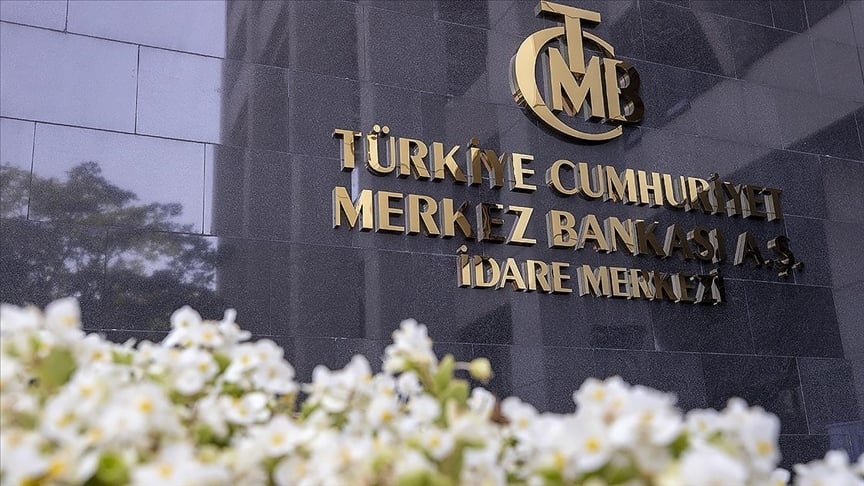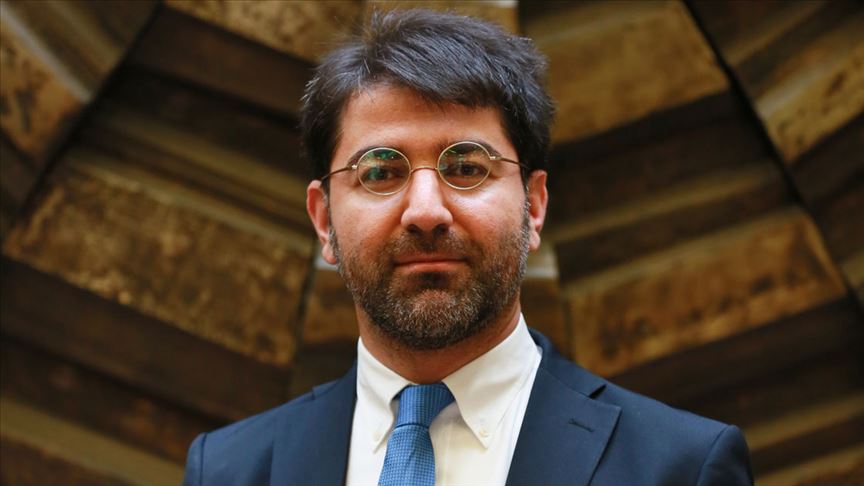Baran Aytaş, who was arrested in the BKM corruption investigation, accused former Central Bank Deputy Governor Emrah Şener

Former General Manager Baran Aytaş, arrested in a corruption investigation into the Interbank Card Center, of which the Central Bank of the Republic of Turkey is a major shareholder, attempted to exploit effective remorse in his statement to the prosecutor. Aytaş held then-Central Bank Deputy Governor Emrah Şener responsible for tenders determined to have caused 66,224,448 lira in public losses, saying, "I acted believing I was acting in the state's interest, and he used me as a tool."
Former General Manager Baran Aytaş, who was arrested in a corruption investigation into the Interbank Card Center (BKM), of which the Central Bank of the Republic of Turkey (CBRT) is a major shareholder, stated in his statement to the prosecutor's office that he wanted to exercise effective remorse. According to a report by journalist İsmail Saymaz, Aytaş blamed then-CBRT Vice Governor Emrah Şener for irregularities in tenders.
The Istanbul Chief Public Prosecutor's Office announced on October 17 that the Central Bank had filed a criminal complaint against 14 individuals, including Şener and Aytaş, in December 2024. Seven individuals detained on October 10 were arrested, while three were released on probation. An arrest warrant was requested for four individuals who were found to be abroad.
In his statement, Aytaş stated that Şener was his graduate professor and that his employment at the Central Bank came about through him. Aytaş, who began his career as Şener's advisor in 2017, was appointed Deputy General Manager of the BKM in 2021 and then General Manager six months later. He was suspended from his position in December 2024.
Aytaş made the following statement: "Şener requested and contributed to my appointment to the Central Bank and the positions I assumed at the BKM. He is my immediate superior. Because he is responsible for payment systems and the BKM, he has a say in appointments."
The first of five irregularities identified by the Central Bank Inspection Board concerned the "Purchase of Chip-Enclosed Plastic Cards" and the "Specification and Applet Software Development for TROY" tenders awarded to Enarge Engineering Education Consulting Research Development Industry and Trade Limited Company. The Central Bank determined that these two tenders caused a public loss of 66,224,448 Turkish Lira.
According to the Inspection Board report, the commission to determine the approximate cost of the 2.5 million chip cards was not appointed by the tendering authority. The 30-day supply period was not met, and two companies were prevented from submitting bids. The price was paid before delivery, and the tender was awarded to Enarge despite not having an authorized dealer certificate.
The BKM Procurement Commission predicted the tender would fall short of 66 million lira. The tender was awarded to Enarge for $3.235 million, equivalent to 64.269 million lira. Aytaş said, "You should ask Enarge if it's so close to the financial limit," implying that the company learned the price in advance.
The chip cards were supposed to be delivered within 30 days, but were sent to the BKM seven months later, despite having been paid for. Aytaş stated the following in his statement: “Şener suggested that Enarge should be one of the companies invited to the tender to produce domestic national cards, providing an alternative to foreigners. He has contact with the company. Driven by national sentiment and believing it to be a state-sponsored approach, we followed Şener's instructions.”
Enarge's owner, Taha Meli Arvas, turned out to be an acquaintance of Şener's from Özyeğin University. After Arvas was appointed acting chairman of the Capital Markets Board in 2020, he transferred the company to Hüseyin Halit Özdamar. Özdamar left his authority to Mehmet Taha Durmuş and Erdoğan Alkan. The prosecutor's office issued arrest warrants for Durmuş and Alkan.
Arvas currently serves as General Manager of Energy Market Operations. Arvas's father, Ercümend Arvas, is Chairman of the Board of Aselsan and a member of the Presidential Science, Technology, and Innovation Policies Board. The file also includes information that Arvas published a joint book with Alkan, to whom he transferred his son's company.

Despite no demand from banks, BKM provided 2.5 million chip cards to Vakıfbank free of charge. Vakıfbank rejected them, saying, "We didn't have any demand." Aytaş stated the following in his statement: "We announced to the banks that we would provide 2.5 million cards. Since only Vakıfbank had requested them, we provided them free of charge. Vakıfbank informed us that they had no demand and that we could discuss them with other banks. However, since we had subsequently obtained the cards, they had to be given to a bank. They were delivered to Vakıfbank in accordance with Şener's instructions."
The full payment for the project was made to Enarge the day after the tender. No other bids were received from other companies for the Specification and Applet Software Development tender for TROY. Aytaş said, "On the day of the tender, Şener kept me informed and asked if there were any bidders other than Enarge."
According to Aytaş's claim, Muhammed Güven, who joined the Central Bank as an intern, was hired by Şener at BKM. Güven was sent to Singapore for two weeks on January 13, 2023, where he founded the company "EM Smartechs."
Of the $4.1 million paid by BKM to Enarge, $3.3 million was sent to this company in Singapore under the guise of "chip purchases." Aytaş said, "This is a front company established for this purpose." Güven was also arrested on the same day as Aytaş and Şener.
In his statement of confidence, he said, "Chips flow from China are going through me. I'm one of the top three companies in this field in Türkiye. How can I be a shell company?" However, it turned out that the company was founded just five months before the BKM tender.
The second irregularity identified by the Central Bank Inspection Board concerned an agreement with Boğaziçi University's Technology Transfer Office (TTO). According to Aytaş, 44.15 million lira was paid for the two projects.
It was determined that the contract was awarded without a price quote, payment was made before the work was completed, and a tender was not held. According to the report, Şener arranged for Associate Professor Ali Coşkun, with whom he had a joint article, to be appointed project manager. Şener's brother İbrahim received 200,000 lira, while the Singapore-based company received 693,236 euros.
Aytaş said, “I suspect that the money paid to TTO was shared between Şener and these circles.”
It was determined that Aytaş sent 2 million lira to Güven's account. When asked why, Aytaş claimed he gave Şener money from his salary to secure his job.
When I transferred to BKM, Şener told me my salary would increase. When I told him I'd been overpaid, he said, "Save the extra money. I'll tell you when the time comes." I saved for two years. He said, "I hired you at BKM, and you'll pay me the extra money. Everyone I hired gave me the extra money." Fearing I'd lose my job, I sent the 2 million lira to Güven, whom Şener had recommended.
Aytaş claimed that former General Manager Mehmet Zahit Samancıoğlu and his assistant Bora Koç also sent money.
The third charge in the case relates to agency services received from a company called Be Bold. A total payment of 1,857,900 lira was considered embezzlement. The company's owner, Çağkan Göktuğ, is Aytaş's cousin. Be Bold was founded two and a half months before the tender.
Aytaş stated, "He did the work for less money just to avoid upsetting me and to support the local project. It's true that there are alternative companies, but we wanted to keep the project of changing TROY's name to 'Lirakart' confidential."
The fourth charge concerned the use of a corporate credit card issued to Aytaş for personal expenses. In his statement to the prosecutor's office, Aytaş stated: “Şener repeatedly asked for the card. At first, I refused. He threatened me by saying he had me transferred to the BKM and that he could also dismiss me. I gave it to him out of fear of losing my job. Şener made the expenses.”
The fifth charge was related to students studying abroad, known to Şener, being shown as interns at BKM and issuing meal cards for these individuals.
Aytaş stated that he hand-delivered the meal cards to Şener, saying, "I don't know who used them." This statement suggests the cards were not given to interns.
Aytaş, claiming that Şener used him as a pawn, concluded his remarks by saying, “I acted under Şener's orders and instructions, believing I was acting in the state's interest. He used me as a pawn. I didn't benefit from a single penny. He promised me that he would receive money for tenders and other service procurements and that he would give me a share. I never made any commitments or received any money.”
In response to the allegations, then-Central Bank Deputy Governor Emrah Şener denied the accusations in his statement at the Istanbul 2nd Criminal Court of Peace. Şener stated, “I was a deputy governor at the Central Bank of the Republic of Turkey (CBRT). I have no connection to tenders or transactions at the BKM. There was only one money transfer directed to me. That was a 200,000 lira transfer made by a friend during my time as a faculty member at Boğaziçi University. I do not have the authority to appoint personnel at the BKM .”
According to his biography at Özyeğin University, where he previously worked as an academic, Emrah Şener completed his undergraduate studies at Boğaziçi University. He completed his master's degree at the London School of Economics and his PhD in Mathematical Finance from Imperial College London. He joined Özyeğin University after working in the London offices of HSBC and Citibank. He was appointed Deputy Governor of the Central Bank in September 2016. He was reappointed to his position at the Central Bank in September 2020 by decision of President Recep Tayyip Erdoğan.
Medyascope





